Falkirk Council sets out financial challenges in five-year strategy

Councillors will be asked to approve Falkirk Council’s next five-year financial strategy that seeks to bring a balanced position to its finances going forward next month.
In a report to be presented on 2 October, councillors will hear about the financial pressures facing the council, the actions already being taken, and the proposed further changes needed to put budgets on a more sustainable footing.
It projects a funding gap of £43.9 million over the next five years, with the largest shortfall of £18.8m expected in 2026/27; the gap is the difference between what the council spends to provide services and the money it has coming in.
The costs of running local services are rising faster than income with pay settlements, inflation and energy prices all continuing to add pressure. At the same time, the council’s main source of income is expected to remain flat in cash terms for the foreseeable future. This means that more of the burden has to be met locally through cost reductions, Council Tax increases and increases to fees and charges.
Just under 80% of the council’s income comes from the Scottish Government, with around 18.5% from Council Tax. The council also collects around 3% through fees and charges. This limited control over income makes the financial position particularly challenging.
The Strategy sets out the two ways the gap can be addressed: raising income or reducing expenditure. In practice, both will be required. Options put forward include:
- finding efficiencies and cutting surplus in existing budgets
- redesigning or reducing some services
- raising Council Tax and some fees and charges
investing in longer-term transformation projects, such as digital services, property rationalisation, and the Council of the Future programme.
Since 2010, the council has saved around £115m. Many of the easier savings have already been made, meaning further measures are likely to have a more visible impact on communities.
The report also highlights the risks of relying on one-off measures, such as service concessions, to balance the books. While these provide temporary relief, they do not tackle the structural financial deficit which will still have to be addressed and they increase borrowing costs in later years. The council’s aim is to end this reliance by 2026/27 so that recurring income matches recurring spending.
Reserves are currently held at £11.8m, within the agreed range, and a further £8.6m has been set aside in a contingency reserve. This is designed to provide targeted support to areas under the greatest pressure, such as social care and children’s services.
Budget engagement with communities will continue, with feedback gathered helping councillors make final decisions in March 2026 on savings, fees, and charges.
Amanda Templeman, chief finance officer, said: “The financial pressures on councils across Scotland are severe, and Falkirk is no exception. Costs are increasing across all areas – from pay and contracts to energy and social care – but our funding is not rising to match.
“This Strategy outlines a clear plan. It sets out how we can deal with the funding gap, reduce our reliance on one-off measures, and make sure we are living within our means. To do that, we will need to change how we deliver services, find efficiencies, and ask residents to contribute more through Council Tax and charges.
“If this plan is accepted, it is hoped we can stabilise our finances and give ourselves a stronger base for the future.







